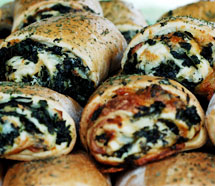
The old saying “you say tomato I say tomatoe” is never more true than in the foodie realm of stuffed dough pockets. In some cultures they’re called calzones, other empanadas or perhaps the word you prefer pierogi or in my world the bourekas.
Basically we’re talking about an all in one hand held meal or appetizer here. Perfect for any high holiday meal and especially delicious when eaten in the Sukkah. They’re typically small to medium pastries here, utilizing yeast dough, shortening dough, puff pastry or phyllo crust, kinda sorta resembling a turnover that can be filled with everything from potatoes to cheese and/or vegetable and/or meat and possibility a sauce.
To be more culture specific: Calzones are an Italian treat that literally translated to mean “baggy pants”. Dim Sum is a small oriental inspired turnover with seasoned mixtures of meat, fish, or vegetables. Then there’s the empanada, translated from Spanish, surprising no one, to mean; sandwich. Empanadas are sometimes filled with ground meat or sweet potatoes or fruit or raisins. Pasties hale from merry old England were, once upon a time, the favorite foods of the Cornish miners to take with down into the coal mines. Pirogues are filled pockets of dough, Polish in origin and are usually served as a side dish. Spanokopitas are light flaky Greek baked treat, typically made with phyllo dough filled with spinach, cottage cheese, feta cheese and olives. And last but not least there’s the bourekas (or borekas) Bourekas are an eastern European delicacy that have traditionally been shaped a specific way to indicate their filings.
So we’re all agreed, nothing beats a flaky, hot, freshly baked stuffed (fill in the blank here) except maybe eating the next one, or having one or two leftover for shalosh ses. I know, I know, too many possibilities, not enough recipes. Oh, wait, you will have recipes IF you just read a little bit further. Enjoy.
The words of this author reflect his/her own opinions and do not necessarily represent the official position of the Orthodox Union.

